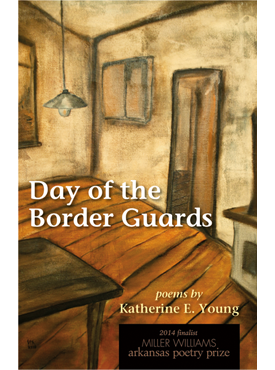Finalist: 2014 Miller Williams Poetry Prize
Day of the Border Guards, the debut collection from Katherine E. Young, is set entirely in Russia and the countries of the former Soviet Union. The ghosts of Russian writers Pushkin, Mandelstam, Tsvetayeva, and many others wander through these poems, making tea, fighting with their relatives, cursing faithless lovers. Bulgakov’s heroine Margarita describes meeting the Master; Lermontov’s grandmother worries that the young poet is wasting his life. Lady Macbeth is alive and well and living in post-Soviet Georgia. Enemies stalk the margins: hostile warlords, informants, the secret police. A man falls through the ice into a ruptured hot-water pipe, nuclear reactors melt down, an airplane lands on Red Square. Perestroika arrives and departs, like other fashions. A marriage falters. The phone rings in the middle of the night in a Siberian hotel. The corpse of a gypsy king boards a plane for Moscow.
Young, who also translates Russian poetry and prose, has lived and worked in Russia and the Soviet Union off and on since 1981: not surprisingly, then, these poems—originally published in The Carolina Quarterly, The Iowa Review, and The Massachusetts Review, among others—willfully skip across borders of language, culture, and literary tradition, exploring Russian and North American poetic traditions and celebrating both.
Katherine E. Young is an award-winning translator of Russian poetry as well as the author of two chapbooks of original poetry.
“Katherine E. Young’s Day of the Border Guards is very much about crossing borders—those between reality and, in this case, Russia. Which is to say she offers us a Russia of direct experience and the transformed country of the imagination. Her text is dense with marvelous detail, dramatic intensity, and intentions that are unmistakable in their insight and judgment. Young chooses to represent both herself and the voices of various personae, sometimes, in fact, as one blended voice: hers and Akhmatova, hers and Mandelstam.”
—Stanley Plumly, author of Orphan Hours: Poems
“In Day of the Border Guards, Katherine Young examines what it means to be a poet of witness. And what she’s a witness to happens to be nothing less than the Soviet Union before the fall. Hers is a journey haunted by the ghosts of Pushkin and Bulgakov (“I could be myself, or any one / of Pushkin’s women, or Margarita walking / the alleys with yellow flowers in her arms”), the ghosts of dissident poets like Osip Mandelstam, and the personal ghosts of romantic disappointment and philosophical doubt (is she a witness who sees but feels nothing? or is she unable to see at all?). Young’s odyssey is staggering in its scope and vision, but poetry lives in the details and here there are innumerable places where the poetry simply takes your breath away. In “Nearing Chernobyl,” for example, Young writes: “For there’s enchantment aplenty here: / the cold wheeling of comets, breath / of the sun howling down on the rump / of a woman peeing by a tree in Ukraine. / I carry the dust of the universe on my shoes.” Lines any poet—even Pushkin or Lermontov or Mandelstam—would be proud of.”
—John Surowiecki, author of Flies
Honorable Mention, North Carolina Poetry Society’s Brockman-Campbell Award
“Katherine E. Young’s Day of the Border Guards is a commendable book reflecting an astute understanding of Russia, its history, and countrymen. A skilled craftsperson, the author ingeniously creates poems that bear witness to a compelling past. Here is a poet capable of unveiling humanity with a vibrancy that lingers. Even a dezhurnaya—or museum docent/guard—gains relevance alongside figures as eminent as Osip Mandelstam and Mikhail Lermontov. Here is a writer, whose lyricism resonates in the reader’s mind long after closing the book. This debut collection is a standout for a writer who is well-versed in the art of observation.”
—Dr. Carolyn Kreiter-Foronda, Brockman-Campbell Award Judge
“Young lived in Moscow during those last days of the Soviet empire, when the country ran on rubberbands and spit. Winters were brutal. Centralized heating was about as effective as the centralized government: when uninsulated pipes ruptured, people burned to death—and all the pipes were uninsulated. These poems are bone-chilling: looking out her window, Young sees “leafless birches // shivering the ice-covered court yard” (“Centralized Heating”). But Russia isn’t all about bad weather and feeling out of place. And Young’s poetry is anything but drab and dreary. This is also a world of vodka, tea, and hand-knotted rugs. In fact, the poems are so deeply imbued with Russianness that Young might be a Russian poet herself, very ably translated by the American poet Katherine Young! There’s such a sense of authenticity—a familiarity with the environment, the people, and the great Russian writers themselves—that the reader never feels these are travel poems.
Young’s eye is especially attuned to landscape, which accounts for many rich, lush descriptions:
The road from Samarkand
slices blue-black and bored
through the salt-veined desert,
past cotton fields bleached
copper green and white,
past mulberries massed
in dusty ranks like soldiers
of the Great Khan.
(“The Cow”)
…
This is Russia, a land of hope and a land of despair. Katherine Young captures both in language vivid, precise, and surprising. As she writes in “Speaking Russian,” “The antechamber of learning is the knowledge of languages.”
—Poet Lore, 2015

